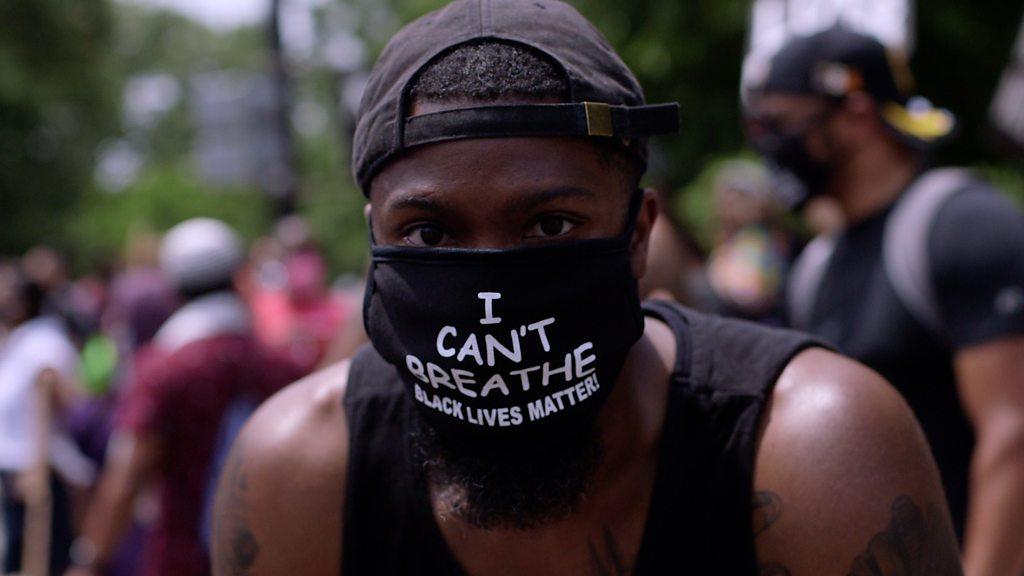Breonna Taylor: Police officer charged but not over death
- Published
Kentucky Attorney General Daniel Cameron presented the grand jury decision
A police officer has been charged over the narcotics raid that resulted in the fatal shooting of a black woman at her home in the US state of Kentucky.
Breonna Taylor, 26, a hospital worker, was shot multiple times as officers stormed her home on 13 March.
Brett Hankison has been charged, not with Ms Taylor's death, but with "wanton endangerment" for firing into a neighbour's apartment in Louisville.
Two other officers who were involved have not been charged.
Under Kentucky law, someone is guilty of wanton endangerment if they commit an act that shows "an extreme indifference to the value of human life".
This lowest-level felony offence can come with a five-year sentence for each count. Mr Hankison was charged on three counts.
Ms Taylor's relatives and activists for whom her death has become a rallying cry had been calling for the three officers, who are all white, to be charged with murder or manslaughter.
But this was rejected by a grand jury that reviewed the evidence.
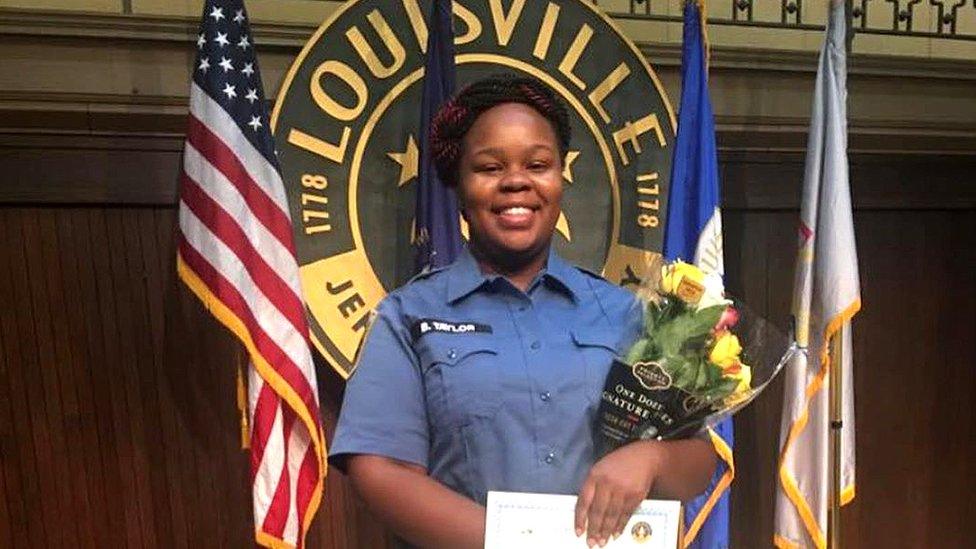
Taylor, an emergency medical technician, was 26 when she died
What did the prosecutor say?
On Wednesday, Judge Annie O'Connell announced the charges that had been brought by a grand jury against Mr Hankison.
Kentucky Attorney General Mr Cameron then held a news conference in which he expanded on the decision. "This is a gut-wrenching emotional case," he said.
"There is nothing I can offer them today to take away the grief and heartache as a result of losing a child, a niece, a sister and a friend," he added in a message to Ms Taylor's family.
Mr Cameron said a ballistics report had found that six bullets struck Ms Taylor, but only one was fatal.
That analysis concluded that Detective Myles Cosgrove had fired the shot that killed Ms Taylor.
The attorney general said it was not clear if Mr Hankison's shots had hit Ms Taylor, but they had hit a neighbouring apartment.
Protesters march in Louisville following the grand jury decision
The top prosecutor said the other two officers - Jonathan Mattingly and Mr Cosgrove - had been "justified to protect themselves and the justification bars us from pursuing criminal charges".
Mr Cameron, a Republican who is the state's first black attorney general, added: "If we simply act on emotion or outrage, there is no justice.
"Mob justice is not justice. Justice sought by violence is not justice. It just becomes revenge."
He added that the FBI was still investigating potential violations of federal law in the case.
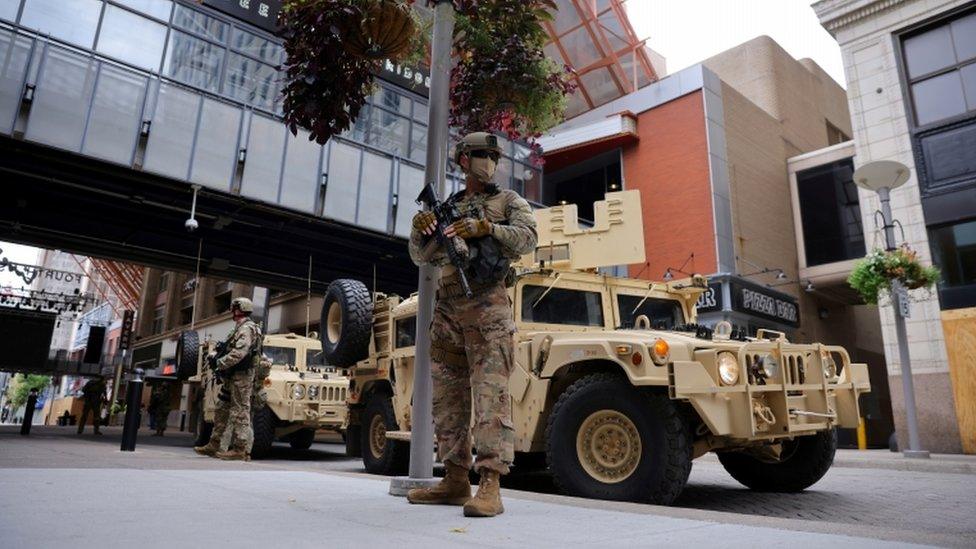
The National Guard were deployed in Louisville ahead of the announcement
What's the reaction?
Ben Crump, a high-profile lawyer for the Taylor family, said the outcome was "outrageous and offensive".
Officials this month agreed to pay her family $12m (£9.3m) in a settlement.
Asked for his reaction to the decision, Mr Trump told a White House news conference: "I thought it was really brilliant."
He praised Kentucky's attorney general, who addressed the Republican party convention last month, for "doing a fantastic job".
"I think he's a star," he said, adding that he approved of the Kentucky governor's decision to send in the National Guard.
Governor Andy Beshear, a Democrat, urged Kentucky prosecutors to release the evidence that was presented to the grand jury.
"I think having more of the facts out there so people can see, people can truly process it, is where we need to be," Mr Beshear told reporters.
How are Louisville authorities reacting?
A state of emergency was declared in Louisville on Tuesday and protests are expected. The National Guard have also been deployed.
Mayor Greg Fischer has set a 21:00-06:30 curfew in the city that will remain in place for the next 72 hours. He earlier said he had declared a state of emergency "due to the potential for civil unrest".
Police have closed traffic on certain streets where protests have been prevalent, and barricades have been erected around the city centre.
Demonstrations over Ms Taylor's death have been held in the city for more than 100 consecutive days.
The National Guard deployment has been criticised because one of its troops fatally shot a black restaurant owner, David McAtee, as authorities dispersed Black Lives Matter protesters in June.
The police department said its officers had come under fire while they were trying to clear the area. But after officers on the scene were found to have not activated their body cameras, the city's police chief was sacked.
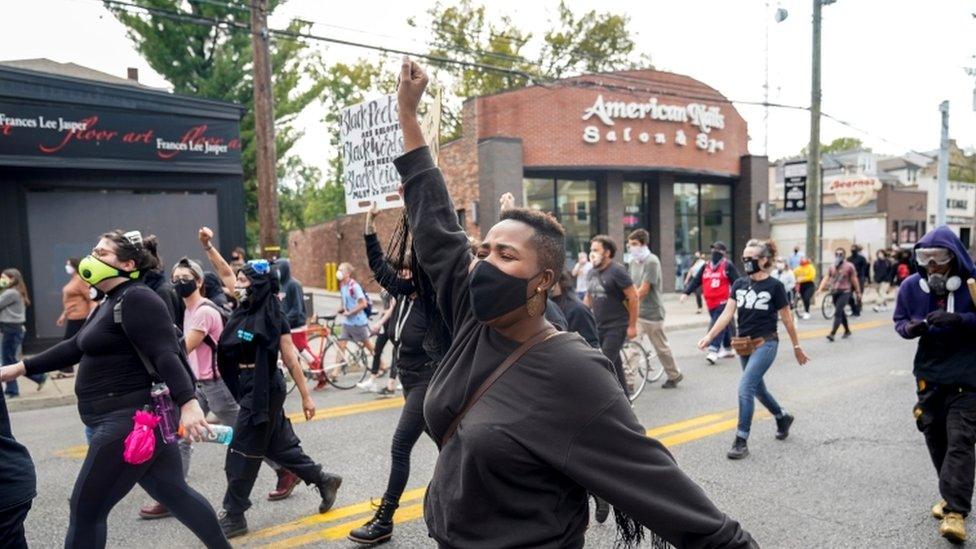
What happened to Ms Taylor?
Shortly after midnight on Friday 13 March, she was in bed with her boyfriend, Kenneth Walker, when they heard a banging on the door.
Plainclothes Louisville police officers were carrying out a narcotics raid, and they used a battering ram to enter the property.
A judge had granted a warrant to search Ms Taylor's home because investigators suspected a convicted drug dealer - her ex-boyfriend, Jamarcus Glover - was using the address to receive packages. She had no criminal record.
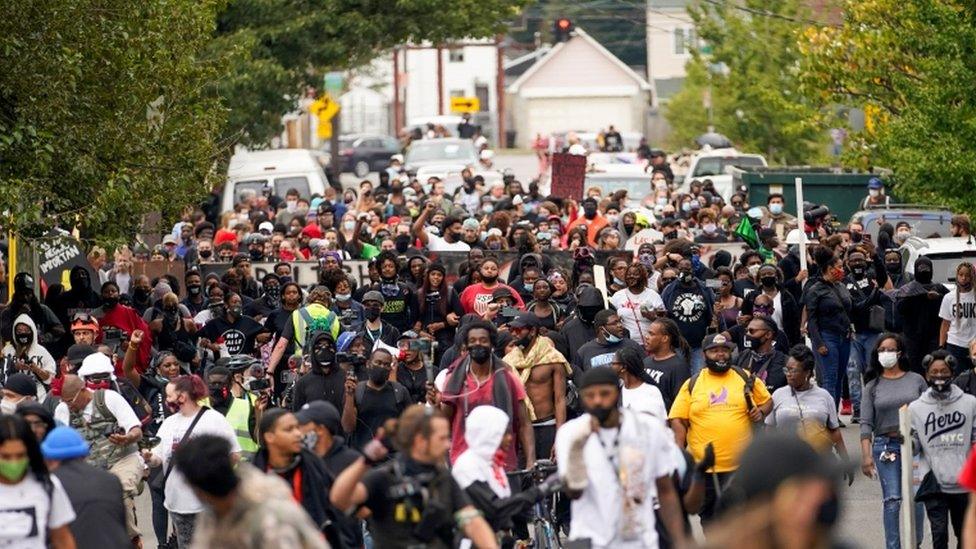
Mr Walker, a licensed gun owner, later told police he thought the late-night intruder was Glover, according to the New York Times.
Officials say Mr Walker's bullet struck a police officer, Jonathan Mattingly, in the leg - an injury for which he later required surgery.
The three officers returned fire, discharging 32 rounds, according to a ballistics report from the FBI.
Ms Taylor, who had also got out of bed amid the commotion, was shot and died on the hallway floor.
According to an arrest report, the officers had been granted a "no-knock" warrant, allowing them to enter the property without warning.
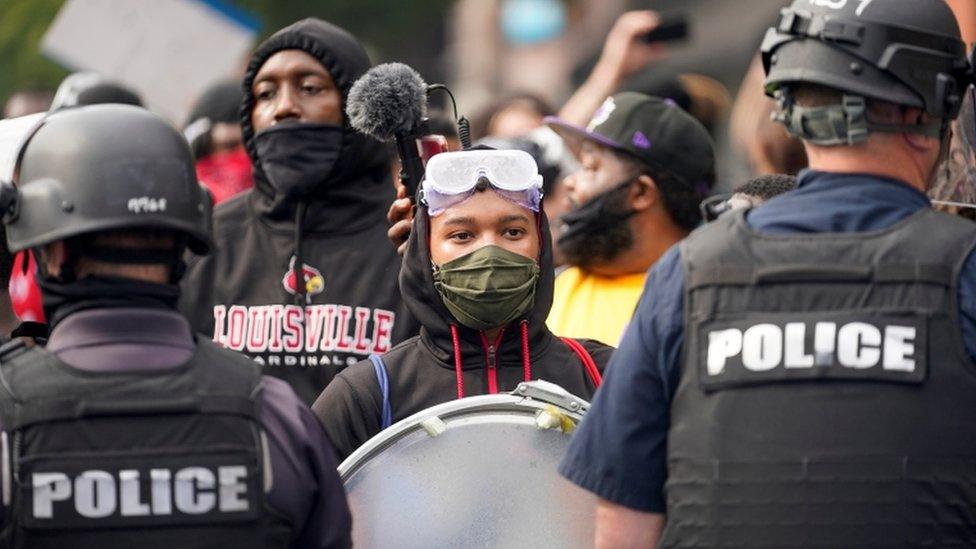
But Mr Cameron said on Wednesday the officers had not actually served such a warrant. The attorney general said the officers' statements that they identified themselves "are corroborated by an independent witness".
Some neighbours told local media they did not hear the officers announce themselves.
No drugs were found at the property, though Jefferson County prosecutor Thomas Wine has previously said the search was cancelled after the shooting.
The subsequent police report contained errors, including listing Ms Taylor's injuries as "none" and saying no force was used to enter, when a battering ram had been used.
Mr Walker was initially charged with attempted murder and assault of a police officer, but the case against him was dropped in May amid national scrutiny of the case.
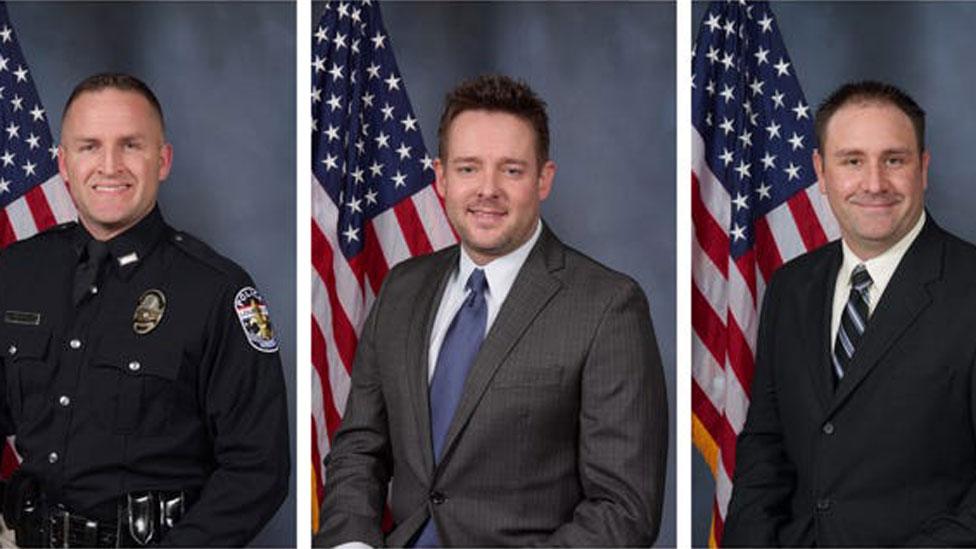
From left: Brett Hankison, Jonathan Mattingly and Myles Cosgrove
What about the officers?
Mr Hankison was fired from the Louisville Metro Police Department in June after investigators found he had "wantonly and blindly fired 10 rounds" during the raid, according to his termination letter.
Mr Mattingly and Mr Cosgrove were reassigned to administrative duties.
The Louisville Courier-Journal has reported that six officers are under internal police review for their role in the shooting.
Mr Mattingly wrote an email on Saturday to more than 1,000 colleagues in which he criticised city leaders and protesters.
"Regardless of the outcome today or Wednesday, I know we did the legal, moral and ethical thing that night," he wrote in the message, which was published by media outlets on Tuesday.
"It's sad how the good guys are demonised, and the criminals are canonised."
"Your civil rights mean nothing," he added, "but the criminal has total autonomy."

Are you in Louisville? Share your views and experiences by emailing haveyoursay@bbc.co.uk, external.
Please include a contact number if you are willing to speak to a BBC journalist. You can also get in touch in the following ways:
WhatsApp: +44 7756 165803
Tweet: @BBC_HaveYourSay, external
Please read our terms & conditions and privacy policy
If you are reading this page and can't see the form you will need to visit the mobile version of the BBC website to submit your question or comment or you can email us at HaveYourSay@bbc.co.uk, external. Please include your name, age and location with any submission.
- Published23 September 2020
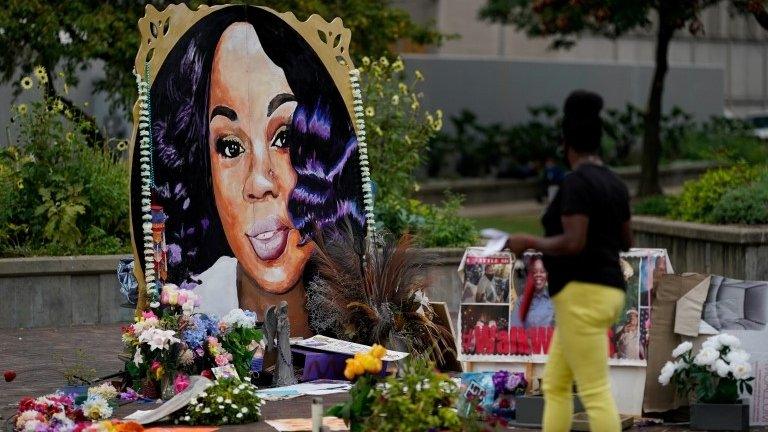
- Published15 September 2020
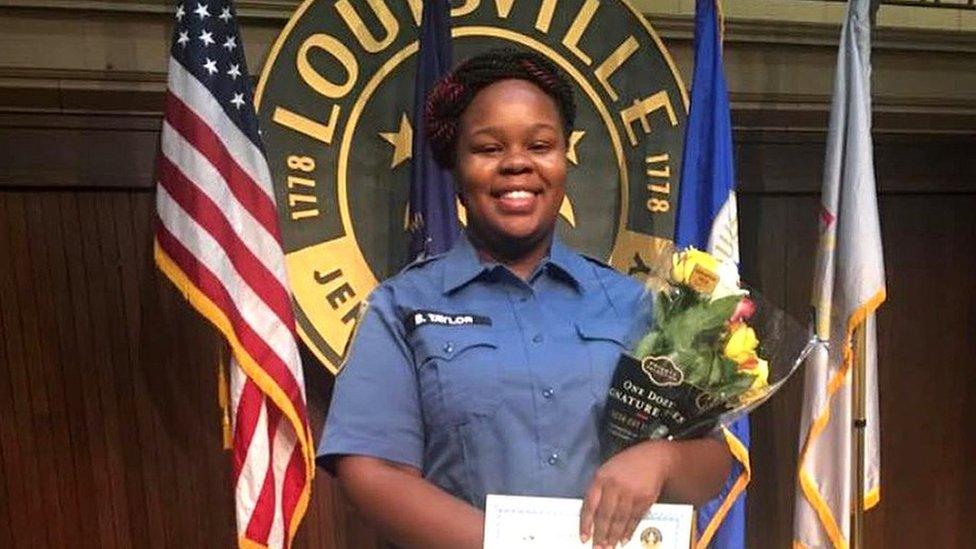
- Published8 October 2020

- Published22 April 2021
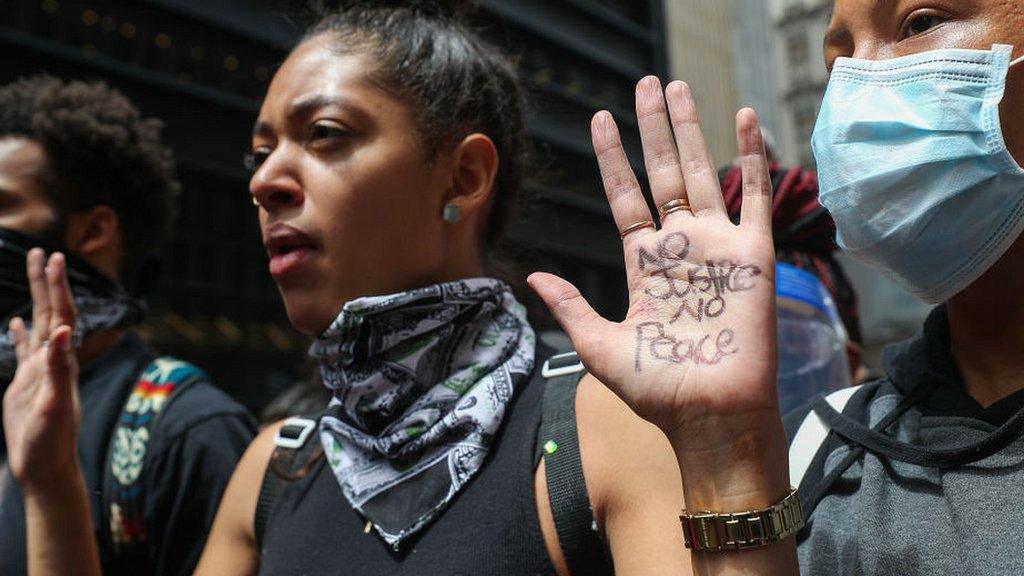
- Published7 June 2020
